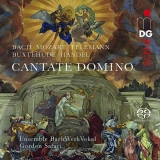 Cantate Domino (Bach, Mozart, Telemann, Buxtehude, Händel); Ensemble BachWerkVokal, Gordon Safari; 1 CD MDG 902 2138-5; Aufnahme 07/2018, Veröffentlichung 09/2019 (65‘40) – Rezension von Jan-Geert Wolff
Cantate Domino (Bach, Mozart, Telemann, Buxtehude, Händel); Ensemble BachWerkVokal, Gordon Safari; 1 CD MDG 902 2138-5; Aufnahme 07/2018, Veröffentlichung 09/2019 (65‘40) – Rezension von Jan-Geert Wolff
Eine Debüt-CD sollte, nein muss sogleich Akzente setzen. Das gelingt dem 2015 gegründeten Ensemble BachWerkVokal unter der Leitung von Gordon Safari mit seinem bei MDG erschienen Erstling Cantate Domino in der Tat. Das Motto Singet dem Herrn zieht sich dabei durch alle eingespielten Werke, die gleichfalls ein Who is who des Barock abbilden: Bach, Telemann, Buxtehude und Händel. Und sozusagen als Special Guest Mozart mit ganz besonderen Beiträgen.
Doch der Reihe nach: Es beginnt mit Bachs Kantate Singet dem Herrn; Safari hat hierfür aus dem vorliegenden Material die beiden ersten Sätze neu rekonstruiert und bildet mit einem glänzenden Vokalensemble, knackigen Bläsern und einem homogen wie äußerst vital musizierenden Barockorchester das Motto der CD gleich zu Beginn bildhaft ab. Leider schweigt sich das Booklet über die genaueren Schritte der Rekonstruktion aus, doch ist die Intension, hiermit ‘ein neues Lied’ anzustimmen, wohl zweifelsohne realisiert. Eingangschor und Schlusschoral sind ein Ausbund an festlicher Barockmusik und machen sogleich Lust auf Mehr.
Bei Telemanns Vertonung von Psalm 98 (TVWV 1:1345) vergnügen die Naturhörner im tänzerischen Eingangschor. Wie bei Bach überzeugen auch bei den anderen Kantaten – Buxtehudes Cantate Domino (BuxWV 12) und Händels O Sing unto the Lord a New Song (HWV 249b) – Instrumentalisten und Solisten. Sie stammen sämtlich aus den Reihen des Chores, der trotzdem als geschlossenes Ensemble und eben nicht als Versammlung von Einzelstimmen agiert.
Bevor Bachs Motette Singet dem Herrn (BWV 225) das deutsch-lateinisch-englische Klangkompendium stimmungsvoll und erneut beispielhaft abschließt, lernt man aber noch Mozart von einer heiteren Seite kennen – schließlich soll das Gotteslob auch den Sänger selbst erfreuen: Jeweils wischen den Kantaten und vor der Motette singen die Vokalisten die vier Rätselkanons KV 73r, 2 und schaffen damit eine Verbindung zwischen ihrer salzburgischen Heimat und Bachs Leipzig, schließlich zählte Mozart zu den großen Bewunderern des Thomaskantors. Vor allem der letzte ‘in una maniera molto speciale’ ist ein besonders Vergnügen.
A debut CD should, no must immediately set accents. The Ensemble BachWerkVokal, founded in 2015 under the direction of Gordon Safari, has indeed succeeded in doing this with its first album Cantate Domino, released by MDG. The motto Singet dem Herrn runs through all the works recorded, which also depict a Who is Who of the Baroque: Bach, Telemann, Buxtehude and Handel. And as Special Guest Mozart, so to speak, with very special contributions.
The program begins with Bach’s cantata Singet dem Herrn; Safari has reconstructed the first two movements from the available material and, with a brilliant vocal ensemble, crisp wind instruments and a homogeneous and extremely vital baroque orchestra, illustrates the CD’s motto right at the beginning. Unfortunately, the booklet is silent about the more precise steps of the reconstruction, but the intention to intonate ‘a new song’ has undoubtedly been realized. The opening chorus and closing chorale are a paragon of festive Baroque music and immediately stimulate the appetite for more.
In Telemann’s setting of Psalm 98 (TVWV 1:1345), the natural horns in the dance-like opening choir are a delight. As with Bach, the other cantatas – Buxtehude’s Cantate Domino (BuxWV 12) and Handel’s O Sing unto the Lord a New Song (HWV 249b) – are also convincingly performed by the instrumentalists and the soloists. They all come from the choir, which nevertheless acts as an homogeneous ensemble.
Bach’s motet Singet dem Herrn (BWV 225) concludes the compendium in an atmospheric and exemplary manner, but before one gets to know Mozart from a cheerful side – after all, the praise of God should also delight the singer himself: The vocalists each wipe the cantatas and sing the four Rätselkanons KV 73r, 2 before the motet, thus creating a connection between their Salzburg homeland and Bach’s Leipzig; after all, Mozart was one of the great admirers of the Thomaskantor. Above all, the last ‘in una maniera molto speciale’ is a special pleasure.
























